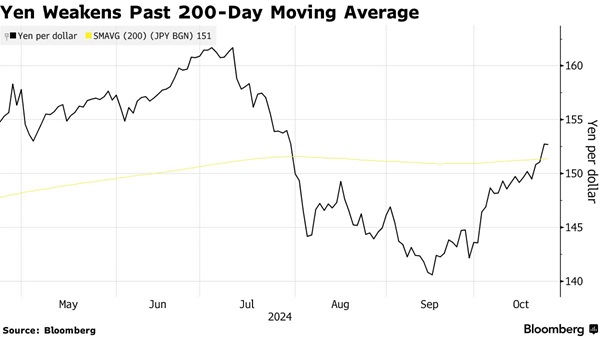The Japanese yen has fallen to its lowest level in nearly three months, with analysts suggesting that USD/JPY may be at 155
On Wednesday (October 23), the USD/JPY exchange rate fell to its lowest level in nearly three months, once again raising concerns that Japanese officials may take measures to support the yen if it continues to depreciate.

(Screenshot source: Bloomberg)
On Wednesday, the Japanese yen fell 1.4% against the US dollar to 153.19 yen, closing at its lowest level since the end of July.
As of Wednesday's close, the USD/JPY rose 166 points, or 1.1%, to 152.67.
The decline in the Japanese yen led to the USD/JPY breaking through the key 200 day moving average of 151.38, which analysts say opens the door for further appreciation of the currency pair.

(Screenshot source: Bloomberg)
Bloomberg analysis said that the US treasury bond bond yield rose sharply, the US dollar generally strengthened and the yen fell due to the signal of the Federal Reserve's cautious attitude towards interest rate reduction. People speculate that the next US government may implement more inflation policies after the presidential election, which will also boost the US dollar.
Monex forex trader Helen Given said, "The yen is once again on a dangerous path, especially considering the very low possibility of the Bank of Japan raising interest rates at next week's meeting
Given stated that by the end of this year, the Japanese yen is likely to fall back to the level of 155 yen per US dollar.
Bank of Japan Governor Kazuo Ueda hinted that more interest rate hikes are imminent. He said in Washington on Wednesday that determining the right scale and timing for further normalization of interest rates "keeps me awake all day".
Yukio Ishizuki, senior foreign exchange strategist of Daiwa Securities in Tokyo, said: "Given the current momentum, the yen may further weaken, and the dollar may further strengthen. If the yen continues to weaken, the authorities may take measures to curb it."
For Nomura International Plc, if the yen weakens further after this weekend's elections, it would not only increase the likelihood of intervention, but could also prompt the Bank of Japan to hint at a rate hike as early as December at next week's policy meeting.
Nomura foreign exchange strategist Yusuke Miyairi said, "The yen seems to be playing a regulatory role at the moment, easing various pressures on Japan's macroeconomy
On October 17th, major Japanese media predicted that the ruling Liberal Democratic Party may lose its absolute majority in the House of Representatives for the first time since 2009 in this month's elections. If this situation arises, the Liberal Democratic Party will need the help of its governing partners to maintain control over the House of Representatives.
The Daily News predicts that the Liberal Democratic Party will win 203 to 250 seats in the House of Representatives, which means the party may not reach the 233 seats needed to gain a majority, marking the first time since losing power in the 2009 election. The House of Representatives is the more powerful of the two houses of the Japanese parliament. The Nihon Keizai Shimbun reported that the LDP may not be able to obtain a majority of seats.
Japanese Prime Minister Shigeru Ishiba has acknowledged that the Liberal Democratic Party may lose its majority in the October 27th elections and has set a goal of securing a majority with the help of the Komeito Party.
Marito Ueda, head of the market research department of SBI Liquidity Market Company, said that the yield of long-term US treasury bond bonds remained high. The last time this happened was in July, when the US dollar/yen was at a high of about 161.
Ueda said: "Before the impact of the US presidential election subsides, the yield of US treasury bond bonds is unlikely to fall, and the US dollar is unlikely to be sold."
So far in October, the Japanese yen has fallen by about 6% against the US dollar, which may be the worst month since April 2022. This month, all currencies of the Group of Ten (G10) have fallen against the US dollar, as traders are preparing for the November 5th US election and the Federal Reserve is expected to relax monetary policy slower than previously anticipated.
Tips:This page came from Internet, which is not standing for FXCUE opinions of this website.
Statement:Contact us if the content violates the law or your rights
